- When should I add salt to my pool? And how much should I add?
Now here’s your hosts – Matt and Rob.
How often do I need to add salt to my pool?
Carmen, from Florida
There is no set timeframe of when you need to add salt to your pool. Because salt does not dissipate from your water, the only time you would add salt to your pool is when you add fresh water or after heavy rain that dilutes salinity levels. An example of when you would add fresh water is after a heavy backwashing cycle.
Take a look at our guide on adding salt to your pool: How to Add Salt to Your Pool
A helpful tip for adding salt to your pool: add the fresh water first, then measure your salinity levels to determine how much salt should be added to your pool. After the freshwater has been added, test your water either by reading your salt chlorine generator’s control box, taking it to a local
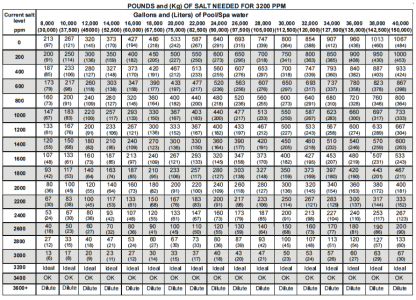
pool, or use a home saltwater test kit.
Once you have the salt levels noted, consult your owner’s manual’s salt chart to determine how much salt is needed to raise your pool’s water levels. The picture to the left is an example of a salt-to-gallons chart found in the Hayward AquaRiteliterature. If you need help estimating gallons, use this pool volume calculator.
If you have any questions about how often you should add salt to your pool, feel free to leave a comment below.
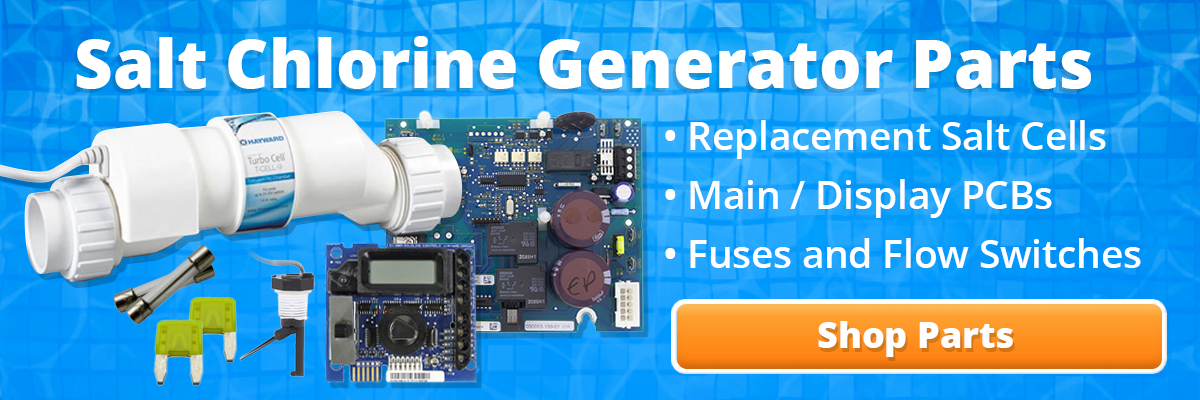
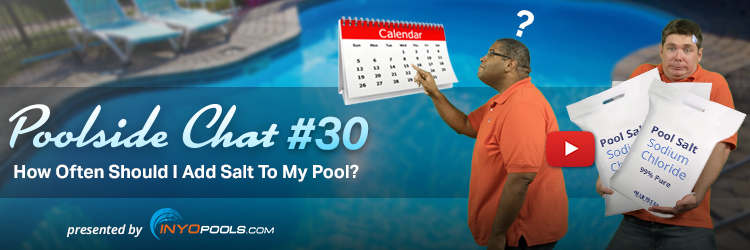
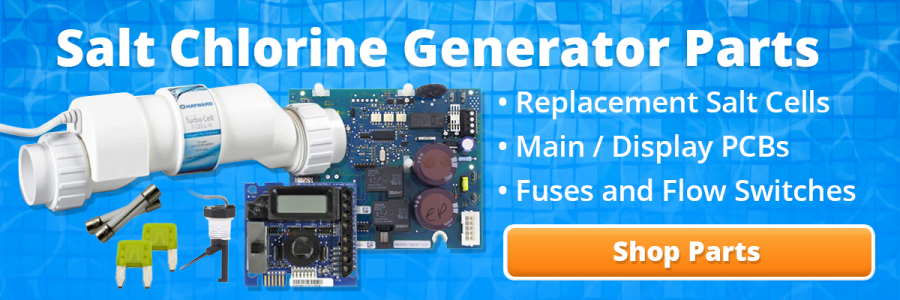
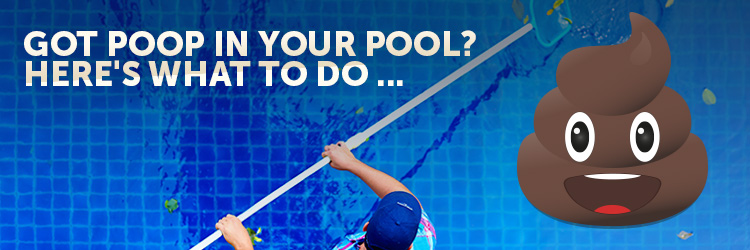
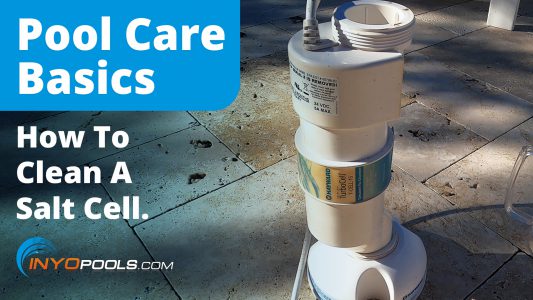
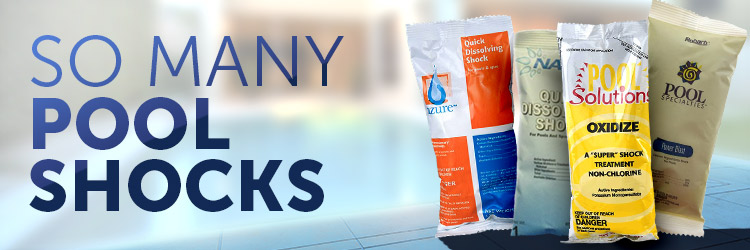






I have the Pentair Intellichlor SWG ( less than a year old). I recently had my 17,000 Gallon pool levels at the required level (3600). The light came on later with low salt reading. I tested and it was reading 2400. I added salt, got the level back up to 3600 and it’s now saying low salt again and reading 2400 and it’s only been a couple of weeks if that. We are in VA; temps in the 90’s and we did just got six inches of rain. My question is it normal for the numbers to drop that much after six inches of rain and have to add 2-3 bags of salt again?
If you add freshwater to saltwater, it is going to dilute the salt water. So, it is not an outside possibility it is just the rain. If it is dry for a couple of days and it still drops, then there would be cause for concern.
I have a new pool this year and it is a regular pool they gave me tablets and some thing to put in the pool every week. When they put the pool in the guy didn’t know it and he put 20 bags of salt in it We are not a saltwater pool we do not have a system. How do I get my pool to clear up since the salt doesn’t dissolve . The manager made a mistake and gave us the right chemicals for our pool but now I’m not sure if it’s cloudy because of the ph and alkaline which we would not have had to add. Our pool is 16×38. I am so disappointed because it is not 100% clear and I think it’s because the chemicals they gave us don’t mix with the salt they put in by mistake. Does anyone know what I should do
I’ve not come across any pool chemicals that warn against use in salt water systems. The only way to remove it would be through water replacement. There are plenty of ways that will happen over the life of the pool and I wouldn’t do it on purpose. Basically, let it ride. The salt is doing no harm unless it was added at extreme levels. (You didn’t state the depth/volume of the pool or the size of the bags but I’m assuming they added the correct amount for the -size- of the pool at least. Otherwise, fire that pool company.) May even make your water feel more “silky” as it is often described.
The salt will absolutely have dissolved. There is no such thing as undissolved salt in water. The ocean is many times more saline and in parts of the world, crystal clear. Cloudiness comes from any number of other factors, especially with a newly started up system. For a new pool, I would check the filtration system if it persists. But sometimes particles are just too small or you may have a light algae bloom. I normally have a crystal clear pool here in NJ. But if it rains a lot or there is a heat wave like as of late, cloudiness will occur. I recommend a natural chitosan based clarifier like Tidal Vision’s Crystal Clarity. Within 48 hours my pool is crystal clear again. Best luck and enjoy your pool.
It would help to know how big the bags were, in terms of weight. Salt pools generally take a few hundred pounds of salt to raise the salt ppm to acceptable levels. Eventually, the salt will dissolve into solution, making it imperceptible. I’m not sure of the type of chemicals they provided you, but most basic water balancers will work in salt water or traditional chlorine pools.
I have a new Hayward pump with salt cell (T-cell 15). The reading on my panel shows the salt is constantly declining. I keep adding salt to maintain 2700-3200ppm. I cleaned the salt cell and recalibrated the system.
As of now, my salt is reading 2700ppm. When I have it tested at the local pool store, it’s always reading about 300 more ppm than what shows on my panel.
It’s summertime and I’ve never had to add salt in the past. Please help!
Thank you.
Just for clarification, is the salt cell new too? If not, how old is it?
The salt cell is 3 years old.
It seems like your cell is bad. To confirm this, in your settings, make sure the correct cell type is selected, then check your cell’s amp rating. If your TCELL15’s amp ratings read outside of the 3.1 – 8.0 range then your cell is definitely done for.
We have to clean or salt cell every week and each time it has huge calcium build ups on it. Our pool is 2 1/2 years old. It’s a 10,000 gallon pool and we live in AZ.
Sarah, we live in Arizona too and have the same problem as you. I am constantly cleaning the calcium build up from my salt cell as well. When it works well the pool is a dream. When I have to clean the cell every week it becomes a nightmare. Sometimes I consider changing over to regular chlorine pool system. Help from someone would be appreciated. Thank You.
How often do i add salt to my 4440 gal pool?
If you go back and watch video again, we explain you only need to add salt in the examples we illustrate.
I don’t doubt anyone’s knowledge but I don’t understand the often heard “you should never need to add salt to your pool.”
The chlorine generator breaks the salt into it’s two components to create the chlorine level in the water. If you don’t have the correct level stabilizer (comically shortened to CYA) then the sun evaporates the chlorine from the water. I believe that even with the CYA correct there is still an amount of evaporation of the chlorine.
Am I correct so far?
The other thing I often hear is that the chlorine (CL) rejoins with the sodium (NA) in the water to make new salt (NACL). I dont believe this is possible in the water without some sort of chemical process or catalyst.
AM I still on the right track?
So if the salt is broken down into its components and either one disappears or they are not able to come back together then the salt levels would consistently lower as the system operates. That explains why I have to add 120 – 160lbs of salt every year to my 14,000 gallon pool.
Could the left over sodium then explain why either my hardness level is higher then when the pool was new and climbing constantly, or why I always need to add acid to adjust the ph levels down?
This has always confused me.
Okay, that made go look up how it works and they way I described is not correct Electrolysis creates hydrogen gas, hypochlorous acid and hypochlorous ions from the water and salt solution.
Now I gotta figure out why I have to add so much salt each year. If I turn off autofill the pool level does not go down over a several week period so I don’t think it’s leak.
Hello Don,
You did a lot of research and you beat me to the punch with the answer to your question. lol
But now that you are an expert on salt chlorine generators, it is time to find that leak. If you are looking for a quick fix in the meantime look into Marlig Fix-a-Leak. It is a nice stop gap (no pun intended), so you can you put off heavy repairs for later in the summer or fall. If you want to read more on whether Marlig might work for you, read our blog on the subject: Will Marlig Fix-a-Leak Work for Me?
I have my pump on and then sometimes it says no flow system is off why does the red light comes on when it says no flow but the pump is on
Is your pump a dual or variable speed pump? If your pump switches to a lower RPM that drops the flow rate below the required GPM for the unit, then you will see that alert.